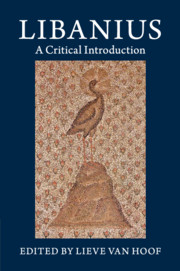Book contents
- Frontmatter
- Dedication
- Contents
- List of tables
- Notes on contributors
- Preface
- Abbreviations
- Introduction: Libanius at the margins
- Part I Reading Libanius
- Part II Libanius’ texts: rhetoric, self-presentation and reception
- Part III Contexts: identity, society, tradition
- Chapter 9 Emperors and empire in Libanius
- Chapter 10 Libanius’ networks
- Chapter 11 Libanius and the literary tradition
- Chapter 12 Libanius and the ‘game’ of Hellenism
- Chapter 13 Not the last pagan: Libanius between elite rhetoric and religion
- Epilogue Libanius at the centre
- Appendices: survey of Libanius’ works and of available translations
- References
- Index locorum
- General index
Chapter 12 - Libanius and the ‘game’ of Hellenism
from Part III - Contexts: identity, society, tradition
Published online by Cambridge University Press: 05 October 2014
- Frontmatter
- Dedication
- Contents
- List of tables
- Notes on contributors
- Preface
- Abbreviations
- Introduction: Libanius at the margins
- Part I Reading Libanius
- Part II Libanius’ texts: rhetoric, self-presentation and reception
- Part III Contexts: identity, society, tradition
- Chapter 9 Emperors and empire in Libanius
- Chapter 10 Libanius’ networks
- Chapter 11 Libanius and the literary tradition
- Chapter 12 Libanius and the ‘game’ of Hellenism
- Chapter 13 Not the last pagan: Libanius between elite rhetoric and religion
- Epilogue Libanius at the centre
- Appendices: survey of Libanius’ works and of available translations
- References
- Index locorum
- General index
Summary
Introduction
The fourth century witnessed tremendous changes and upheavals in the fields of religion, politics and society. The most striking of these changes was the astonishing advance of Christianity from a persecuted minority to the official state religion, destined in turn to suppress other kinds of religious worship. Supported by political and social developments such as the Christianization of the imperial aristocracy, the penetration of Christianity into the heart of the Roman Empire was bound to have a profound impact on both individual and collective identities. For political and other reasons, individuals and groups shifted their religious allegiances and sought to shape their self-image by distancing themselves from and marginalizing competing belief systems. Stable, or seemingly stable, identities became blurred or even contested. Individuals and communities were forced to rethink their position towards religious or social issues, which gave rise to an intense discourse on identities. As part of this discourse, many traditional aspects of their lives such as ethnicity, culture, ethics and religious adherence intermingled in a new fashion and gained new relevance.
Of particular interest in these controversial debates is one type of identity which underwent a significant change in meaning and evaluation. Hellenism, the condition of being Greek, once more came to the fore as a result of religious struggles since the Fathers of the Church had taken up the term for labelling non-believers. Once the adherents of the pagan gods had adopted this policy for their self-definition, Hellenism developed into an ambivalent expression with either positive or negative overtones, depending on who made use of it and for what purposes. The issue became even more complex as Christians who were brought up in the classical tradition refused to break with the values of Greek culture, advocating instead a harmony of Christian belief and Hellenic tradition.
- Type
- Chapter
- Information
- LibaniusA Critical Introduction, pp. 268 - 292Publisher: Cambridge University PressPrint publication year: 2014
- 3
- Cited by

